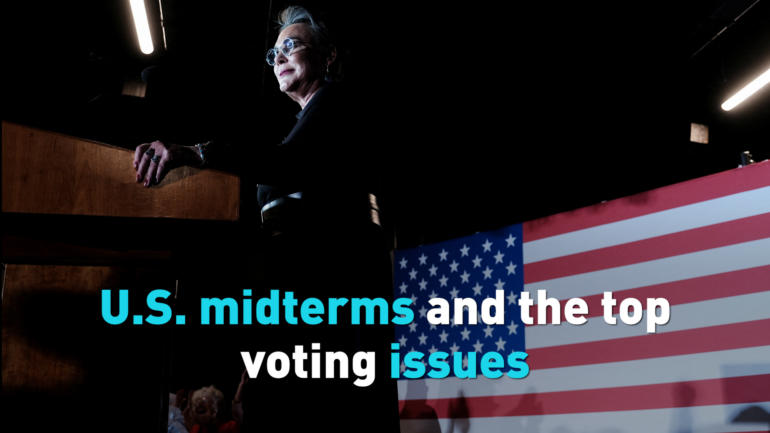With fewer than three months until the U.S. midterm elections, the economy remains one of the key issues facing Democratic and Republican voters.
That finding comes in a national survey released this week by the nonpartisan Pew Research Center.
In addition, researchers say that following the Supreme Court’s Roe v. Wade ruling that ended the constitutional right to a legal abortion in the United States, Democrats are placing more emphasis on the issue.
The Pew Research Center conducted a national poll of 7,647 adults, including 5,681 registered voters, from August 1 through 14. It looks at a variety of issues, notably abortion and gun policies.
The Pew survey found Republicans continue to regard the economy as the single most important issue in the upcoming elections. The economy is crucial to nine out of 10 Republican voters, approximately 20 percentage points more than any other issue.
Health care is a very important vote concern for 77% of Democrats, while abortion and gun policy are also very important (71% each), Supreme Court appointments (69%), the economy (67%), and climate change (66%).
Here is the breakdown on the issues that will play the biggest role in voters’ choice, according to the Pew Research Center.
Abortion rights:
The majority of registered voters (56%) say abortion will be a big issue in the midterm election, up from 43% in March. 71% of Democratic and Democratic-leaning registered voters consider abortion to be very important, up from 46% in March. Republicans and Republican-leaning voters have exhibited essentially no change since March (41% now, 40% then).
Economy:
The economy is very important to more than three-quarters of registered voters (77%) in the 2022 congressional election, making it the top issue out of the 15 asked about in the study. Gun policy (62%), violent crime (60%), health care (60%), voting policies (59%), and education and Supreme Court appointments (58% each), are all very important to voters.
Parisian control of Congress:
Republican and Democratic voters are now relatively equally likely to believe that party control of Congress is important (72% of Republicans vs. 69% of Democrats). Democrats’ support for the decision has increased by 9 percentage points from March (from 60% to 69%), while Republicans’ support has remained stable (70% in March).
Approval of Joe Biden:
About half of registered voters (49%) say Biden isn’t a big factor in their midterm vote, since March, the proportion of voters who say Biden has little influence on their voting decision has climbed by 11 percentage points.
Six in 10 Democrats now say Biden will not be a factor in their midterm vote, up from 47% in March. Fewer Democrats see their vote as a show of support for Biden than they did five months ago (36% today, 46% then).
Republicans saw Biden as less important in their congressional vote. Currently, 62% of Republican voters say they will vote against Biden, while 37% believe the president has factored little in their decision. In March, 71% of GOP voters said they would vote against Biden, while 26% said he was insignificant.
A total of 54% of adults believe Biden stands up for his ideas. This is his highest rating out of the six traits assessed in the Pew study; in March 2021, while 66% said he stood up for his principles. Biden receives the lowest marks for being inspiring; 31%.
Trump’s role in U.S. politics:
The Pew Research Center survey found most Republicans still want Trump to be a prominent figure. A majority of Republicans and Republican-leaning independents (63%) want Trump to be a major national political figure for a long time. Among those who hold this opinion, more want Trump to run for president in 2024 (39% of all Republicans support this) than support another candidate who holds the same opinion (23%).
Just like in previous elections, demographic differences play a role in voter preferences.
Election engagement by age, race, and ethnicity
The Pew poll says voters 65 and older are significantly more likely than those under 30 to believe it is important which party controls Congress in November (82% vs. 50%). This is stated by six out of 10 voters aged 30 to 49, and 71% of those aged 50 to 64.
White voters (72%) are more likely to believe that partisan control of Congress is important than are Hispanic (59%), Black (58%) or Asian American (56%). At this point in the campaign, four-in-10 white voters say they have given the election a lot of thought, compared to 30% of Hispanic, 27% of Black, and 17% of Asian voters.
Men (71%) are slightly more inclined than women (66%) to believe that which party controls Congress is important. Men are also more likely than women to say they’ve given the upcoming elections a lot of thought (40% vs. 33%).
Voters’ attitudes around possible election outcomes
Nearly half of registered voters (48%) say they would be either excited (10%) or relieved (38%), if Democrats kept control of the House, while 46% would feel positively if Republicans regained power (13% excited, 33% relieved).
Republicans are nine percentage points more likely than Democrats to be excited if their party controls the House in the next Congress (26% vs. 17%). Meanwhile, Democrats are six percentage points more inclined than Republicans to be upset if the other party controlled the House (32% vs. 26%).
Other issues:
About half of the registered voters in the Pew Research Center survey listed energy policy (53%) and immigration (48%) as very important topics in their vote. Smaller percentages name foreign policy (45%), the size and breadth of the federal government (42%), climate change (40%), and race and ethnicity issues (35%), as being extremely significant in their midterm vote. Only a quarter of voters (28%) feel the COVID-19 outbreak will be very important to their vote, the lowest of the 15 concerns polled.
 CGTN America
CGTN America

